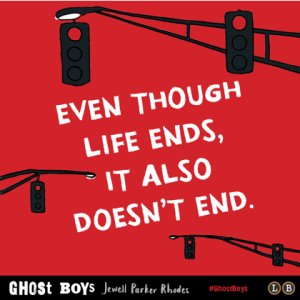I read the latest post at Nerdy Book Club this morning. Twice. Sitting in my car. I was almost late to a doctor’s appointment. “The Guns in Our Stories” by Jeff Seymour was thought-provoking and powerful. Go read it if you haven’t yet.
I’ve not read his books, but he writes what I love about reading–for my students and for myself.
Most stories in my genre are empowerment fantasies. They invite kids to identify with characters taking on more responsibility, and wielding more power, than those kids can in the real world. They solve mysteries, they right ancient wrongs, they fight and win battles against evils of unfathomable strength.
I love this about books. I love reading books that encourage my students to change the world, to make it better, to challenge and teach their parents, to challenge and teach me.
Mr. Seymour goes on to reflect on his own writing and the writing of others, particularly in the genre of fantasy and empowerment stories for children. He points out that these stories often include violence, yet gloss over its impact.
It may be acceptable to harm another person in a few situations, like self-defense. But doing that harm takes an awful toll that’s rarely depicted, and when we leave that toll out we lie to kids. That lack of honesty can be a serious problem.
This struck a nerve with me, because I’ve been reading The Arinthian Line series by Sever Bronny (they’re well-written, fun, long, and there are five–don’t start them if you are in the midst of a big project with a deadline). In the later books, two of the three main characters, who are 14 years old, kill enemies in battle. They do it reluctantly and out of necessity in a battle between good and evil; yet, it sits with each of them; it changes them; they don’t forget it and neither does the author.
It’s one of the very few books for children I’ve read which is honest about this.
The blog post today, reflecting on guns and violence in our lives, in our student’s lives, and in our stories, includes this penultimate paragraph:
When you’re involved in violence as a kid, your security is shattered and your sense of self is threatened. And when you hurt someone, that act hurts you back. The kids touched by violence in our stories should learn this, so that the kids who read them can better understand the violence in their lives and how it affects other people. The best children’s stories already meet this standard. The rest of us should hold ourselves to it too.
Perhaps, it was no accident then, that my copy of Ghost Boys by Jewell Parker Rhodes came in the mail today. And that I sat down and read it, cover to cover.  Ghost Boys is the story of Jerome, a twelve year old, African-American boy, who is shot and killed by a police officer while playing with a toy gun. He tells his story as a ghost, watching the aftermath of his murder and the devastation it causes his family and watching the hearings in the courthouse. He sees other ghosts: Tamir Rice, Trayvon Martin, and Emmett Till, who guides him and helps him find purpose. And Jerome meets the only living person who can see and hear him–the daughter of the police officer who killed him. With righteous anger at the deep injustice, honesty, and a heart-wrenching compassion and generosity, this story for 4th-8th graders makes it real.
Ghost Boys is the story of Jerome, a twelve year old, African-American boy, who is shot and killed by a police officer while playing with a toy gun. He tells his story as a ghost, watching the aftermath of his murder and the devastation it causes his family and watching the hearings in the courthouse. He sees other ghosts: Tamir Rice, Trayvon Martin, and Emmett Till, who guides him and helps him find purpose. And Jerome meets the only living person who can see and hear him–the daughter of the police officer who killed him. With righteous anger at the deep injustice, honesty, and a heart-wrenching compassion and generosity, this story for 4th-8th graders makes it real.
 Death and violence are real.
Death and violence are real.
Injustice and racism are real.
The impact of these tragedies is real and lasting.
We need to make our books and our classrooms and our lives real and tackle real problems in them. We need to be honest and talk about the difficult and terrible real-ness of violence and hatred.
When we don’t talk about violence, when we don’t talk about injustice, when we omit what’s real, we make our books and our classrooms and our lives…not enough. It’s just not enough to ignore ugly reality.
It’s just not enough to ignore ugly reality.
Jerome’s last words are,
Bear witness. My tale is told.
Wake. Only the living can make the world better.
Live and make it better. Don’t let me
(Or anyone else)
Tell this tale again.
Peace out.
Peace.

